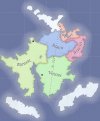This RP is set in
Panthos, one of two large continents in the world Erdu. Panthos is the western continent and is almost exclusively inhabited by humans.
While other beings can still be found lurking in the dark places of the world, this setting contains no elves, dwarves or orcs. Humans are most numerous, after that come the
Ashir whose population numbers no more than ten-thousand. Other races, who may or may not be encountered in this RP, are so few in number to be considered mere myth by most.
The story starts in
Velora, which is the capital of the Ashir. While Velora is also largely inhabited by humans, the fortress city itself is under Ashir control. Here, Ashir and humans live peacefully side by side and have done so for generations. The humans that live in Velora are accustomed to the Ashir and are on good footing with the Empire's valued protectors.
Mitra is the capital of the Empire located many hundreds of miles from Velora. This is the seat of power where the Emperor resides and keeps his strongest legions.
The vast
Mithraic Empire stretches several once-independent nations across the entire continent. Even though they are part of the Mithraic Empire, each nation still has its own name, its own distinct culture, its own food and customs, and its own bylaws. Often, nobles or other high-ranking officials who've proven loyal to the Empire serve as an extension of the Emperor's will. There are no Kings or Queens anywhere, only appointed regional governors and magistrates who command local legions to enforce the common law.
While the Empire's legions are strong and capable, there are too few of them to guard every corner. There are huge stretches of unexplored wilderness that are only part of the Empire on a map where wild tribes make their home. Some of the tribes raid villages while others choose to live far away from civilization and keep to themselves.
The overall setting is low-fantasy (limited magic) that is medieval-esque in nature. There is no gunpowder or steam engine yet, but different regions may have different levels of technological advancement.
Countries
All nations are part of the Mithraic Empire and are ultimately subservient to the Emperor's will. That said, various nations and regions have some level of (seeming) autonomy. Part of the success of the Mithraic Empire is that much of the pre-existing cultures were allowed to remain, and so it is that there is still much cultural diversity to be found throughout the Empire.
The snippets below are meant to give a first impression of the various nations within the Mithraic Empire. More details about these countries will be revealed through play as and when needed.
-
A small nation ruled by a council of nobles from various, opposing houses who have all sworn fealty to the Emperor. Built on the back of a vibrant slave trade, Khoros is a country of extremes. The overcrowded port city Syntioch lays in the shadow of the much smaller, but opulent capital Eskhor, where the nobles reside. A betting man could make his fortune here, or make the wrong sort of friends and find an early grave.
-
More than half of the country is taken up by the treacherous, mysterious Sumir desert. Wandering tribes speak of secret knowledge and hidden treasure buried deep below the shifting sands. Many have chased the tales, but few have succeeded. While the tribes are dispersed throughout the desert, most people are concentrated in a few major cities. The capital, Quma, is a complex blend of dust and spice, rug sellers and fortune tellers, beggers and frauds, mystics and adventurers. For the most part, the country is at peace and ruled by an appointed consul who co-exists along a twelve-headed council of influential sultans, warlords and merchants.
-
One of the larger nations on the continent, Mohsal spans a vast chunk of the east coast and consists largely of great forests whose depths and many secrets remain unexplored. The inhabited part of this great nation sits mostly along the coast with several towns and cities resting further inland, dotted along the rivers that flow out to sea.
-
Because of its weak military, Athesh was the first country to be joined with the Mithraic Empire and as such it has been spared most of the destruction that came with the founding of the Mithraic Empire. The open-minded peoples of Athesh have more interest in food, music, and art than they have in war. Docile and friendly, the sea-side country harbors some of the finest academics, inventors and artists within the Empire and is known for its excellent wines and cheeses.
-
Located in the deep south, Voldas hosts bountiful farmlands along the length of the Tumer river. The Capital, Mitra, is the seat of power of the Mithraic Empire. Most people visiting Voldas do not call the country by its original name, though it is still indicated as such on any map. The power of Mitra is so great that for many, the city is synonymous with the country, and in many ways it is. Many satellite towns can be found dotted along the Tumer river, and further inland too, but none can hold a candle to the splendor of Mitra. The capital has all the beauty of small Eskhor in Khoros, yet a size matching Quma in Sumir. It is from here that laws are made and enforced through legions of so-called redcloaks, stationed throughout the Empire.
But for all its outward beauty, Mitra hides many ugly truths. The palace is a viper's nest of ambitious men and women, weaseling their way up a greasy ladder to try to reach the Emperor's ear. But while some seek to merely control and influence the Emperor, others would rather see the idle man replaced altogether...



